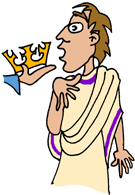|

|
|

The British slice
up Britain

|
- After the Roman
army left Britain, strong or popular men managed to set
themselves up as local rulers or kings. They ruled small
regions, the size of modern counties. They might have an old
Roman town at the centre.
- Books written in the Dark
Ages sometimes call these people 'tyrants'. A 'tyrant' is
someone who is in charge, but who is a bully.
- Writers thought that
proper leaders were given authority by someone in Rome. They
thought the new rulers had bullied people into putting them in
charge. This may not have been true:
- They might have been
leaders on local town councils. These people were called 'decurions'.
- They might have been
respected people from important families.
- They might have been
army officers in the local militia or even officers from
foreign mercenary units.
- A few important
Roman-British officials, like the Duke of Britain, did not
return to Rome. They took charge in some areas.
- At first these rulers
did not call themselves Kings. An old gravestone shows that
Vortepor of Dyfed called himself a Protector. St. Paulinus met
a leader in Lincoln called a Prefect. St. Germanus met a
leader in St. Albans called a Tribune.
- The word 'King' was used
when their position became 'hereditary'. This means that when
a ruler died, his nearest relative became the next ruler.
Women were not usually allowed to rule.
- The Kings lived in big
wooden palaces called Great Halls,
either in towns or in old
hillforts.
- A High-King, like
Vortigern or Arthur, may have tried to lead these local kings.
So they are sometimes called sub-kings or under-kings.
- Lots of different groups
of Saxons settled in Britain.
So it was natural for them to also set up small kingdom with
local kings.
|
Find out: Where
the Local Kings had their Kingdoms.
|

